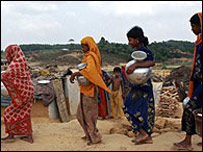درس نوزدهم : آب بنگلادش ممکن است هنوز ناسالم باشد

در گزارش تازه سازمان ملل متحد و بنگلادش که به مناسبت روز جهانی آب انتشار یافته خاطر نشان شده که بیست میلیون نفر از مردم بنگلادش ممکن است هنوز آب ناسالم بنوشند. حدود بیست سال قبل بود که برای اولین بار ناسالم و آلوده بودن آب آشامیدنی بنگلادش کشف شد.
به گزارش گوش دهید
The researchers found that arsenic continues to be a major threat to the good health of millions of Bangladeshis, almost two decades after the problem was first detected, despite a massive effort to provide safe drinking water
They also found that rice, the country’s staple food, can also contain potentially dangerous levels of arsenic, if the crop is irrigated with contaminated water, as happens in several parts of the country
Ministers say that more research is needed on this and that people should not be alarmed
Arsenic poisoning can cause cancers, heart and lung disease. It first became a problem in Bangladesh in the 1970s after the UN dug millions of new tube wells. The water that these wells tapped was contaminated with arsenic, and millions were affected in what the World Health Organisation termed the greatest mass poisoning in history
Mark Dummett, BBC News, Dhaka
به کلمات گوش دهید
آرسنیک(یک ماده سمی کشنده) arsenic
خطر جدی major threat
دو دهه، بیست سال two decades
غذای اصلی مردم staple food
بالقوه خطرناک potentially dangerous
is irrigated : آبیاری می شود irrigated
آلوده، ناسالم contaminated
people should not be alarmed : مردم نباید نگران و مضطرب باشند alarmed
چاههای آبی که با استفاده از لوله های قطور آب آنها بیرون آورده می شود tube wells
مسمومیت جمعی، مسمومیت توده بزرگی از مردم mass poisoning
